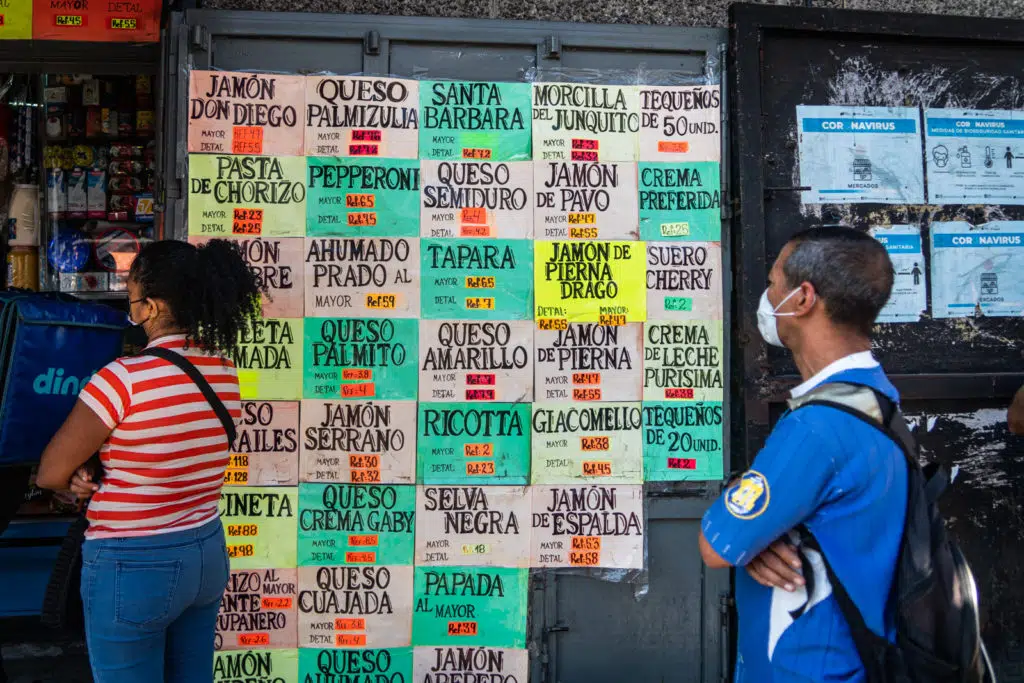
Venezuelans in front of a grocery store watching the prices of food as inflation returns to normal despite US and European illegal sanctions, COVID-19 and the Ukrainian conflict. Photo: El Diario.

Orinoco Tribune – News and opinion pieces about Venezuela and beyond
From Venezuela and made by Venezuelan Chavistas

Venezuelans in front of a grocery store watching the prices of food as inflation returns to normal despite US and European illegal sanctions, COVID-19 and the Ukrainian conflict. Photo: El Diario.
Caracas, April 7, 2022 (OrinocoTribune.com)—Yesterday, Venezuela’s Central Bank (BCV) released its report on Venezuelan inflation for the month of March, reporting a 1.4% inflation rate, less than half of Feburary’s 2.9%.
Venezuelan authorities have been working in recent months to keep inflation at bay, with BCV interventions in the exchange rate market to keep the price of the US dollar at an optimal level, and implementing a restrictive monetary policy to reduce the issue of currency not backed by reserves.
In addition to these measures, many economists were expecting that significant wage increases recently announced by the government, along with the entry into force of the new Tax to Large Financial Transactions—which now taxes US dollar transactions 3% instead of the 2% levied on transactions in Venezuela’s bolívar—would have a negative impact on the BCV inflation numbers. However, this was proven to not be the case, although many Venezuelans have complained about increases in food prices recently.
Alongside the previous measures to contain inflation, Venezuela’s financial authorities announced last month that bonds would be issued in order to reduce a portion of the monetary liquidity, and thus reduce inflationary pressure. This, with the opposite result of the new tax on large transactions in dollars that is encouraging many economic actors to sell US dollars in order to pay their transactions using Venezuelan bolívars, and thus encourage a decrease in the price of the US dollar, might be behind the positive inflation report.
With the March report, the accumulated inflation at the end of the first quarter of the year stands at 11.4%, much lower than the one for the same period last year (127.8%). For its part, the annualized variation corresponding to the month of March was 284.4%, less than a tenth of that observed in March 2021 (3,012.2%).
When separating the inflation by sector, it can be seen that 12 of the 13 categories presented a lower rate in March than that registered in February: The rate of inflation in the communications sector fell from 23.1% to 11.1%; in transportation, from 6.2% to 0.1%; in education services, from 17.5% to 12.2%; in alcoholic beverages and tobacco, from 2.2% to -1.3%; for leisure and culture, from 8.4% to 5.0%; for miscellaneous goods and services, from 4.6% to 1.4%; for restaurants and hotels, from 2.7% to 0.4%; for housing rental, from 2.5% to 0.5%; for home equipment, from 4.6% to 2.9%; for housing services, from 3.2% to 1.6%; health, from 0.8% to 0.5%; and food and non-alcoholic beverages, from 1.1% to 1.0%. The only sector with an increased rate was clothing and footwear, going from 0.4% to 1.9%.
RELATED CONTENT: Inflation in Venezuela at its Lowest Since 2014 (+Colombia)
The official price of one US dollar was at Bs. 4.39 (bolívars) on March 2, and was at Bs. 4.38 on March 31. This represents a revaluation of the bolivar of 0.23%, and more evidence of the work done to successfully contain the inflation in Venezuela that is historically attached to the price of the US dollar.
Despite all positive signs, the inflationary pressure caused by the new tax—and used by many businesses to justify price hikes—should be closely monitored by Venezuelan authorities, according to many experts, particularly when taking into consideration reports of increased food prices. These price changes may also reflect changes in the international scenario created by US and European illegal sanctions against Russian and the conflict in Ukraine.
📊Inflación del mes de marzo 2022
👉🏻Inflación Mensual: 10,5%
👉🏻Inflación Interanual: 251%
👉🏻Inflación acumulada: 17,8% pic.twitter.com/GouGY2Ey7g— Observatorio Venezolano 🇻🇪 de Finanzas (@observafinanzas) April 4, 2022
According to the anti-Chavista NGO Venezuelan Finance Observatory, in a report released last Monday, Venezuela registered an inflation of 10.5% in March, which brings the accumulated figure for the year to 17.8%. However, its unofficial figures show that the inter-annual inflation total was at 251%, 33 points less than the one reported by the BCV. All this occurs in the midst of an international inflationary crisis with its origin in the COVID-19 pandemic, the inability of the capitalist international system to respond to the pandemic, and the Ukrainian conflict.
Featured image: Venezuelans in front of a grocery store watching the prices of food as inflation returns to normal despite US and European illegal sanctions, COVID-19 and the Ukrainian conflict. Photo: El Diario.
Special for Orinoco Tribune by staff
OT/JRE/SL
You must be logged in to post a comment.